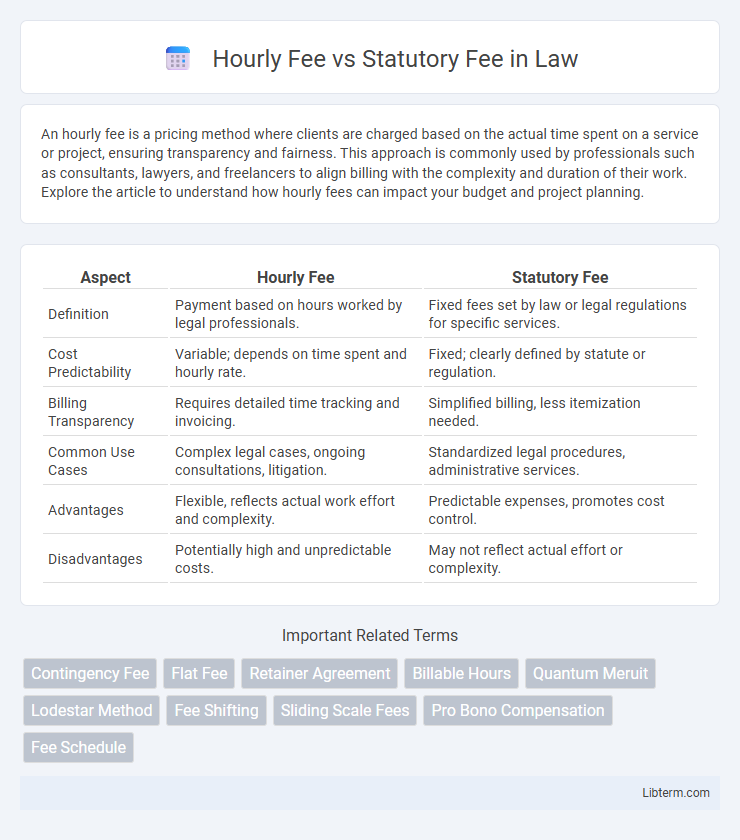An hourly fee is a pricing method where clients are charged based on the actual time spent on a service or project, ensuring transparency and fairness. This approach is commonly used by professionals such as consultants, lawyers, and freelancers to align billing with the complexity and duration of their work. Explore the article to understand how hourly fees can impact your budget and project planning.
Table of Comparison
| Aspect | Hourly Fee | Statutory Fee |
|---|---|---|
| Definition | Payment based on hours worked by legal professionals. | Fixed fees set by law or legal regulations for specific services. |
| Cost Predictability | Variable; depends on time spent and hourly rate. | Fixed; clearly defined by statute or regulation. |
| Billing Transparency | Requires detailed time tracking and invoicing. | Simplified billing, less itemization needed. |
| Common Use Cases | Complex legal cases, ongoing consultations, litigation. | Standardized legal procedures, administrative services. |
| Advantages | Flexible, reflects actual work effort and complexity. | Predictable expenses, promotes cost control. |
| Disadvantages | Potentially high and unpredictable costs. | May not reflect actual effort or complexity. |
Understanding Hourly Fees
Hourly fees represent a billing method where clients are charged based on the actual time spent by professionals, commonly used in legal, consulting, and freelance services. This fee structure provides transparency and flexibility, allowing clients to pay only for the work completed, with rates typically varying according to experience, complexity, and industry standards. Understanding hourly fees involves evaluating the anticipated time commitment, potential for additional charges, and comparing these costs to fixed statutory fees mandated by law.
What Are Statutory Fees?
Statutory fees are legally mandated charges set by government regulations or statutes for specific services or transactions, ensuring standardized costs across jurisdictions. These fees typically apply to tasks like court filings, permits, licenses, or official document processing, providing transparency and predictability in expenses. Understanding statutory fees is essential for accurately budgeting in legal, administrative, or professional service engagements where such fixed charges are enforced.
Key Differences Between Hourly and Statutory Fees
Hourly fees are calculated based on the actual time spent on a project, allowing flexibility but potentially leading to unpredictable costs, while statutory fees are fixed amounts set by law or regulation, providing consistent and transparent pricing. Hourly fees incentivize thorough work and adaptability, whereas statutory fees offer budget certainty and simplify financial planning for clients. The choice between hourly and statutory fees often depends on the nature of the service, regulatory requirements, and client preferences for cost predictability versus service customization.
Pros and Cons of Hourly Fees
Hourly fees offer flexibility by charging clients only for the actual time spent on a service, making them ideal for cases with uncertain or variable workloads. However, they can lead to unpredictable costs and potential budget overruns, causing financial strain or disputes between clients and service providers. Unlike statutory fees, which are fixed and regulated, hourly fees lack uniformity, potentially reducing transparency and complicating cost estimation for legal, consulting, or freelance services.
Advantages and Disadvantages of Statutory Fees
Statutory fees are predetermined and regulated by law, ensuring price transparency and predictability for clients, which helps in budgeting legal expenses more accurately. These fixed fees eliminate the risk of unexpectedly high costs associated with hourly billing, providing clients with financial certainty. However, statutory fees may limit flexibility in pricing for complex or unforeseen legal issues, potentially resulting in overpayment for simpler cases or insufficient compensation for more time-intensive work.
When to Choose Hourly Fee Arrangements
Hourly fee arrangements are ideal when project scope and duration are uncertain, allowing flexibility in billing for variable workloads and changes in client requirements. They provide transparency and control for clients in ongoing legal consultations or complex cases where time investment may fluctuate. Choosing hourly fees is beneficial for tasks requiring detailed, individualized attention and where outcome-based pricing cannot be accurately determined upfront.
Situations Where Statutory Fees Apply
Statutory fees apply in legal or governmental processes where the fee amount is fixed by law, such as court filing fees, patent application charges, or regulatory compliance costs. These fees ensure standardized charges regardless of the time spent on the service, contrasting with hourly fees that vary based on professional service duration. Understanding when statutory fees are mandatory helps businesses and individuals accurately budget for official procedures and avoid unexpected expenses.
Cost Predictability: Hourly vs Statutory Fee
Hourly fees provide flexibility but often lead to variable legal costs due to fluctuating work hours and case complexity. Statutory fees offer greater cost predictability since they are fixed by law or regulation, ensuring clients know the exact amount upfront regardless of time spent. Businesses and individuals prioritize statutory fees when budgeting to avoid unexpected legal expenses and improve financial planning.
Impact on Client-Attorney Relationship
Hourly fees can create uncertainty for clients due to fluctuating costs, potentially straining trust and communication with attorneys. Statutory fees offer predictability and transparency, fostering a more stable and confident client-attorney relationship. Clear fee structures impact client satisfaction and willingness to engage openly during legal proceedings.
Deciding the Right Fee Structure for Your Legal Needs
Choosing between an hourly fee and a statutory fee depends on the complexity and predictability of your legal case. Hourly fees offer flexibility for ongoing or uncertain work but can lead to variable costs, while statutory fees provide fixed pricing for standard services defined by law, ensuring budget certainty. Analyzing your case duration, potential complexities, and financial constraints helps determine the most cost-effective legal fee structure.
Hourly Fee Infographic

 libterm.com
libterm.com